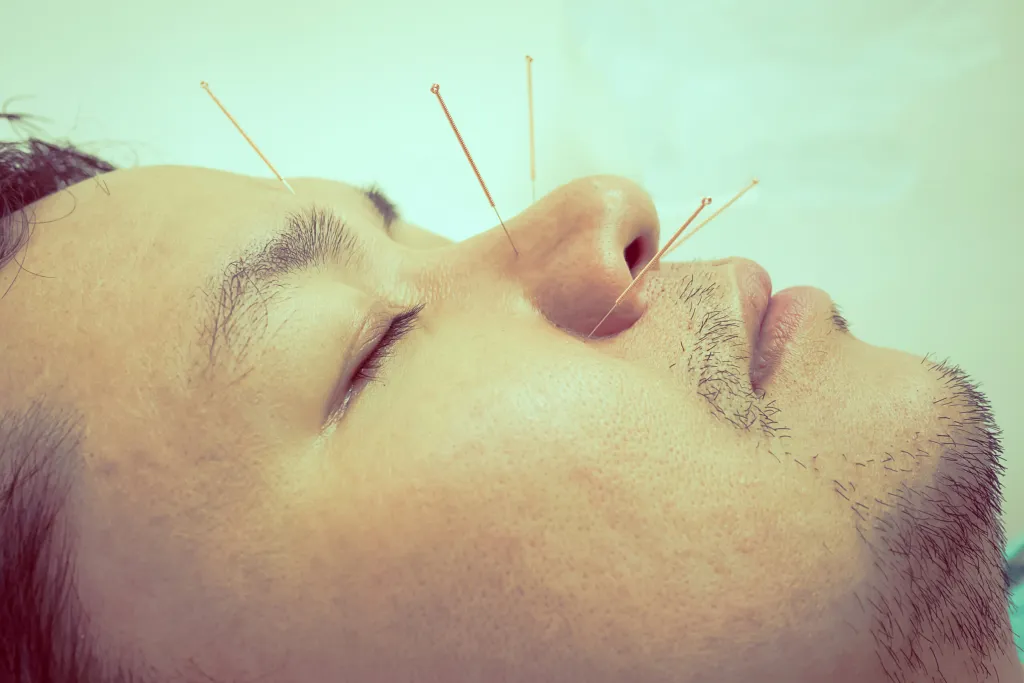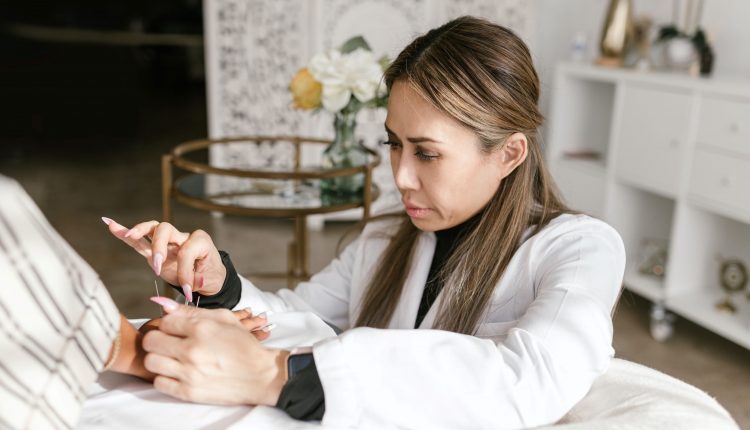
The rise of virtual communication platforms and the shift to remote work has led to a phenomenon known as virtual meeting addiction. Spending excessive hours in virtual meetings can lead to negative effects on mental well-being and overall health. While addressing addiction requires a comprehensive approach, acupuncture can play a complementary role in promoting balance, relaxation, and managing stress associated with virtual meeting addiction recovery. Here’s how acupuncture may contribute to this process:
1. Stress Reduction:
Acupuncture is known for its stress-relieving properties. Prolonged virtual meeting exposure can lead to heightened stress levels due to factors like screen fatigue, information overload, and social isolation. Acupuncture’s ability to stimulate the body’s relaxation response may help individuals manage stress and restore emotional equilibrium.
2. Promoting Mindfulness:
Excessive virtual meetings can contribute to feelings of detachment and reduced awareness of the present moment. Acupuncture sessions provide an opportunity for individuals to disconnect from screens, focusing on their body’s sensations and promoting mindfulness.
3. Restoring Energy Flow:
Acupuncture aims to balance the body’s energy flow, or qi. Spending extended periods in virtual meetings can disrupt this energy flow, leading to feelings of fatigue and stagnation. Acupuncture’s needle stimulation may help restore vitality and improve overall energy levels.
4. Addressing Physical Discomfort:
Sitting for prolonged periods during virtual meetings can result in physical discomfort, including neck and back pain. Acupuncture’s muscle-relaxing effects and pain-reducing benefits may alleviate physical tension and discomfort.
5. Enhancing Sleep Quality:
Virtual meeting addiction can disrupt sleep patterns due to increased screen time and irregular schedules. Acupuncture’s relaxation-inducing qualities may contribute to better sleep quality by promoting a more balanced circadian rhythm.
6. Holistic Approach:
Virtual meeting addiction recovery involves a holistic approach that encompasses both mental and physical well-being. Acupuncture’s emphasis on the mind-body connection aligns with this comprehensive perspective.
7. Creating Mindful Breaks:
Acupuncture sessions can serve as intentional breaks from virtual meetings. These moments allow individuals to step away from screens, reset their focus, and recharge.
8. Collaborative Recovery:
Virtual meeting addiction recovery benefits from a collaborative approach. Integrating acupuncture with other strategies, such as setting boundaries, time management, and seeking professional support, can create a well-rounded recovery plan.
Important Considerations:
• Consultation: Prior to incorporating acupuncture into a virtual meeting addiction recovery plan, consulting a licensed acupuncturist is essential to determine its appropriateness for individual needs.
• Integrated Approach: Acupuncture is most effective when used as part of a comprehensive approach that includes self-awareness, behavioral changes, and other supportive practices.
• Individual Responses: Responses to acupuncture can vary, so individuals should have realistic expectations and be open to exploring its potential benefits.
While acupuncture is not a standalone solution for virtual meeting addiction recovery, it can provide complementary support by addressing stress, promoting relaxation, and enhancing overall well-being. Incorporating acupuncture into a holistic recovery plan that includes self-care strategies, professional support, and mindfulness practices can contribute to managing the negative effects of virtual meeting addiction and promoting a healthier relationship with technology.
The major use of acupuncture today is in the relief of pain. For example severe tension headaches, migraine, acute backaches, shoulder and neck aches, leg pains, trapped nerves, muscle related injuries, after surgery, carpal tunnel syndrome, after sports injuries, menstrual pains, tennis elbow, tooth aches, abdominal pains, arthritic pains, rheumatic pains, sciatica and frozen shoulder.
Other than for pain relief acupuncture can be used for many other ailments as well. These include:
Menopausal symptoms and problems, hot flushes, endometriosis, infertility, premenstrual tension.
Bladder or bowel problems such as irritable bowel and irritable bladder syndrome and incontinence. Difficulty in urination or painful urination, urinary infections and cystitis.
Digestive disorders, which include nausea, indigestion, heartburn and diarrhea.
Respiratory problems, which include asthma, bronchitis, colds and coughs which persist, sinus problems, catarrh and tonsillitis.
Allergies and skin problems such as rhinitis, hay fever, prickly heat, rashes and ulcers, eczema, some types of dermatitis and psoriasis.
Conditions which include the eyes and mouth such as simple cataract, dry eyes, conjunctivitis, retinitis and toothache, pharyngitis, dry mouth condition known as xerostomia and post extraction pain.
Heart problems such as poor circulation, stroke recovery, hypertension.
It also helps in conditions like hiccough, gastritis, gastric ulcers, colitis, constipation, lack of energy and chronic fatigue, insomnia, anxiety, depression, panic attacks, mood swings, post traumatic shock, dizziness, in post operative treatment, in complaints that cannot be diagnosed, Achilles tendonitis and golfer’s elbow.
It can also help in addictions mainly to stop smoking.
In short, acupuncture can be used for almost anything and everything – it can control pain, it helps in addictions and addiction withdrawal symptoms, it helps in enhancement of health, it can help in recoveries after injuries like sports injuries, it can prevent diseases, strengthen the body and it can also be used and show results when all other types of medicines have failed.
Sometimes the acupuncture treatment, which is inserting needles into the body, is done in conjunction with other complimentary techniques such as herbs, massaging, cupping, moxibusion also known as warming, electro-stimulation and with laser devices.
Generally, most people react very well to acupuncture with a sense of well-being and being relaxed and also being able to sleep well and overall increase in energy levels and better digestion. Because acupuncture is a treatment using natural techniques, people rarely suffer from any side effects. It can also be recommended for people of all ages, that is from children to even the elderly.
Treating Addictions With Acupuncture
Addiction has become one of the major problems of society nowadays. Addiction actually takes many forms, from mere addiction to chocolates to substance addiction, and in any way, it can negatively affect the overall health and balance of a person.
Defining Addiction
Addiction usually results from long term and excessive consumption of what the person considers to be pleasurable substances and/or engagement in activities which affect the overall functioning of an individual. According to a medical dictionary, addiction refers to the physiological or psychological dependence on certain practices or substances that has gone beyond one’s control. Some people would consider that addiction occurs when the substance or activity controls the person and not the other way around.
Addiction is classified into two types depending on the item which is being addicted to. It can either be substance addition or behavioural addiction. While substance addition refers to addiction towards harmful substances like cocaine, nicotine and alcohol, behavioural addiction meanwhile refers to extreme obsession towards engaging in activities like gambling, internet browsing, exercise to the extreme and sex.
At some point in time, users may not be aware that their behaviours are getting out of control and it already causes problems to other people. Aside from their inability to control their consumption or usage of certain substances, and incapacity to control themselves from engaging in certain activities, addicts have become so highly dependent on these substances to cope with their daily lives. When a person is addicted to a certain substance, they continue using it regardless of its adverse impacts on themselves and others around them.
According to research, frequent use of certain substances or undertaking certain substances provides pleasure to the brain. As time passes by, the user realises that the higher dose he takes, the greater pleasure he derives. Consequently, his tolerance with the substance increases also. According to experts, the higher the tolerance level is, the higher is the risk for addiction. In the long run, the user no longer finds pleasure in taking substances. More often than not, users are taking substances to prevent suffering from its withdrawal symptoms. Intake of substances can help them feel normal.
To treat addiction, the user must first acknowledge that he is actually suffering from addiction. Treatment normally involves joining in self-help groups, counselling, cognitive behavioural therapy and psychotherapy. Through time, acupuncture has emerged to be one of the most effective complementary treatments for addiction.
Traditional Chinese Medicine (TCM) Explains Addiction
Acupuncture is an ancient form of medicine, whereby the insertion of special needles into the acupuncture points of the body, which lie along the meridians (pathways of energy) is considered to adjust the energy or qi of the body. Stimulating the flow of energy or qi alters many aspects of physical and mental functioning. In fact, it helps in promoting a natural process of detoxifying from substance abuse and addiction.
Those who practice and believe in the system of traditional Chinese medicine have different explanations with regards to the occurrence of addiction. The explanation is solely based on the concept of balancing the yin and the yang. Addicts are said to have yin deficiency. This imbalance of energy results to the feelings desperation and emptiness which drive addicts to use, consume and abuse. However, it only results to yin depletion which leads to further desperation.
Acupuncture Deals With Addiction
Traditional Chinese medicine (TCM), which most often uses acupuncture, as well as specific herbs, is believed to be effective in reducing cravings and in promoting calmness and relaxation. Research shows that acupuncture actually helps in alleviating anxiety as well as in reducing the frequency of occurrence and intensity of withdrawal symptoms. Whether you are addicted to your morning coffee or you cannot control your use of heroine, acupuncture promises effective and natural process of detoxifying your body from substances.
According to research, auricular acupuncture is beneficial in treating various forms of addiction which include alcohol, heroin, morphine, cocaine, crack, methadone, caffeine, coffee, tea and even the use of pain medications such as oxycotin, hydrocodone and vicoden.
The NADA Protocol
According to the NADA Protocol, there are five acupuncture points which can be managed to treat addiction. These are the sympathetic point, kidney point, liver point, lung point and shenmen point.
Stimulating the sympathetic points creates a strong analgesic effect and it helps in restoring the balance of parasympathetic and sympathetic nervous system. Stimulating the shenmen points induces a relaxing and calming effect which helps in alleviating nervousness and anxiety that usually come as withdrawal symptoms.
When the liver point is stimulated, it resolves aggression and anger and repairs the liver from alcohol and drug abuse. Aside from accelerating the process of detoxification, the stimulation of the lung point helps in strengthening the immune system which is important when dealing with the withdrawal symptoms. Lastly, stimulating the kidney point is beneficial in restoring the essence and source of energy which are usually damaged during substance abuse. It also increases the willpower to overcome addiction and resolves fear.
Acupuncture is usually preferred by many in dealing with addiction because it doesn’t generally have any side effects. The treatment is normally given until a person becomes clean from their addiction. Once you cease taking substances, you can reduce your acupuncture treatments but experts suggest that you continue taking acupuncture treatments at least once a month to ensure long term recovery. In fact many ex-addicts learn the benefits along the way and enjoy to come for regular treatments, knowing that it helps their feeling of balance and well-being.


Comments are closed.